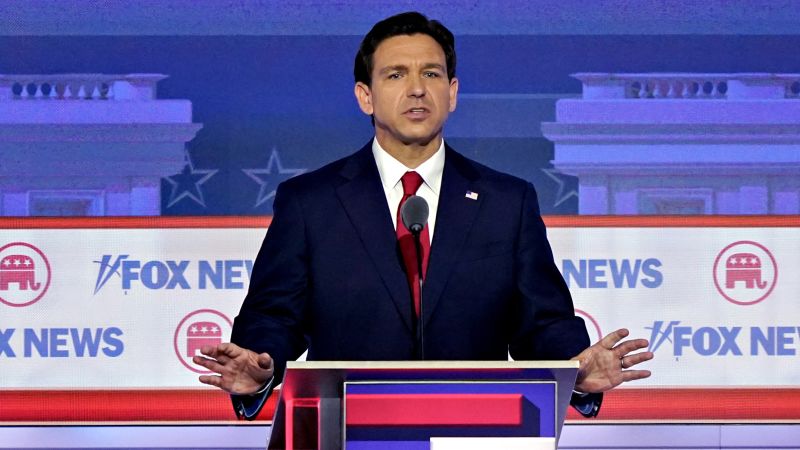Florida Gov. Ron DeSantis reiterates pledge to send US Special Forces into Mexico to confront drug cartels if elected president
Florida Gov. Ron DeSantis has made a bold promise: if he is elected president, he will send US Special Forces into Mexico to confront drug cartels. Speaking at the first stop of his “Never Back Down” bus tour through Iowa, DeSantis expressed his frustration with the cartels’ control and their impact on the United States. He firmly stated, “It’s humiliating to see the cartels have that type of control. They are effectively invading our country and killing our people.”
DeSantis first addressed this issue at the GOP presidential debate, where he made it clear that he would support sending Special Forces into Mexico on day one of his presidency. He emphasized the need for the president to use all available powers as commander in chief to protect the country and its people. DeSantis even took to Twitter to reiterate his pledge.
His spokesperson, Bryan Griffin, revealed that DeSantis plans to declare a national emergency, mobilize all military resources, designate the cartels as narco-terrorists, and change the rules of engagement on the border. DeSantis is determined to utilize the full force of the federal government to stop the illegal drug flow.
While DeSantis is not the only Republican calling for military action against drug cartels, experts warn that such a move could trigger a diplomatic crisis with Mexico. However, DeSantis defends his idea, arguing that the cartels are bringing “death and destruction” to America.
Designating the cartels as a foreign terrorist organization would allow for lethal action, but it would also create diplomatic controversy and outrage in Mexico. The implications for trade could be significant. The situation is extremely sensitive, as US military action in Mexico has been a contentious issue for years.
The authority to deploy US forces in this manner falls under the same rubric as launching a military operation in any other country. While presidents don’t always seek approval from Congress beforehand, they must face Congress afterward. Justifying such action and explaining the emergency that prompted it would be crucial to avoid uproar in the United States and Mexico
Title: Can DeSantis Really Send Special Forces After Mexican Cartels as President?
Introduction:
The rise of Mexican drug cartels and their influence on both sides of the border has become a pressing concern for the United States. As the 2024 presidential election approaches, potential candidates are proposing various strategies to combat this growing threat. One such proposal has come from Florida Governor Ron DeSantis, who has suggested the deployment of special forces to tackle Mexican cartels. However, the feasibility and legality of such an action raise important questions that need to be addressed.
Understanding the Mexican Cartel Problem:
Mexican drug cartels have long been a source of violence, corruption, and drug trafficking, posing a significant challenge to both Mexico and the United States. These criminal organizations have expanded their operations across the border, infiltrating American cities and communities. The need for a comprehensive strategy to combat this menace is evident, but the question remains: can a U.S. president unilaterally send special forces into another country to confront these cartels?
Legal Constraints and International Relations:
The deployment of U.S. military forces on foreign soil is a complex matter governed by international law and diplomatic protocols. The principle of national sovereignty dictates that a country’s internal affairs are its own responsibility, and intervention by another nation is generally considered a violation of this principle. Therefore, any military action against Mexican cartels would require the consent and cooperation of the Mexican government.
Bilateral Cooperation and Diplomatic Channels:
To effectively address the Mexican cartel problem, it is crucial to establish strong bilateral cooperation between the United States and Mexico. This cooperation should focus on intelligence sharing, joint operations, and capacity building within Mexican law enforcement agencies. By working together, both countries can enhance their ability to combat drug cartels and dismantle their networks.
The Role of Special Forces:
Special forces units are highly trained and equipped to handle complex and dangerous missions. Their expertise in counterterrorism, intelligence gathering, and unconventional warfare makes them a valuable asset in combating organized crime. However, their deployment must be carefully considered and authorized within the framework of international law and diplomatic channels.
Alternative Approaches:
While the idea of deploying special forces to tackle Mexican cartels may seem appealing, it is essential to explore alternative approaches that respect international norms. Strengthening border security, investing in intelligence capabilities, and supporting local law enforcement agencies can all contribute to a comprehensive strategy against drug cartels. Additionally, addressing the root causes of drug trafficking, such as poverty, corruption, and lack of economic opportunities, is crucial for long-term success.
Conclusion:
The proposal to send special forces after Mexican cartels, as suggested by Governor Ron DeSantis, raises important questions regarding its feasibility and legality. While the threat posed by these criminal organizations is undeniable, any military action must be conducted within the framework of international law and diplomatic cooperation. Instead of pursuing unilateral actions, a comprehensive strategy that emphasizes bilateral cooperation, intelligence sharing, and addressing root causes should be prioritized. By working together, the United States and Mexico can effectively combat the Mexican cartel problem and ensure the safety and security of both nations.








